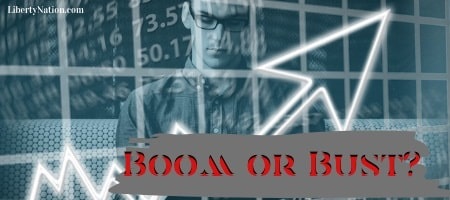Coronavirus life can be pretty depressing these days as you spend all your free time watching cable news, completing puzzles of dogs playing poker, and fighting with your spouse over the superiority of the Atlantic Ocean over the Pacific Ocean. More infections, additional deaths, bearish economic developments, and an old man with inferior mental faculties running for president – this is life in America today. Instead of dwelling on the unpleasant present, perhaps we should look to the future and think about the sunshine and lollipops that await us once we are released from house arrest.
Who knows if COVID-19 cases have peaked in the United States? But we must assess the recovery and the future of a post-Coronavirus world – for the sake of our sanity.
Market Bounce or a Bearish Head-Fake?
Financial markets suffered a severe case of “Sell Everything.” In one month, the U.S. stock market liquidated trillions of dollars in assets to survive from day to day. The enormous equity gains witnessed since the inauguration of President Donald Trump were vanquished like Hillary Clinton’s chances of becoming president. While it was as fascinating as gawking at a car crash on the highway, it was not a pleasant experience for ordinary folks’ retirement accounts.
 To plug the gaping hole in the sinking ship, the Federal Reserve sprang into action. It started its monetary interventions by cutting interest rates, eventually slashing them to 0%. The central bank then offered $500 billion in quantitative easing before raising the stakes and unleashing QE infinity. The federal government also joined in on the fun, passing a few trillion-dollar relief packages.
To plug the gaping hole in the sinking ship, the Federal Reserve sprang into action. It started its monetary interventions by cutting interest rates, eventually slashing them to 0%. The central bank then offered $500 billion in quantitative easing before raising the stakes and unleashing QE infinity. The federal government also joined in on the fun, passing a few trillion-dollar relief packages.
In the coronacrisis, the Fed has been on a printing spree, and Congress has been on a spending binge.
Did it work? So far, the New York Stock Exchange seems to have bottomed on March 23. The Dow Jones Industrial Average just had its best week since the 1970s, the S&P 500 is up 20% from its lows, and the Nasdaq Composite Index is regaining momentum. The blood bath in the broader market appears to have subsided, too. This should be the case if Washington is pumping trillions of dollars into the economy.
Can investors expect more bloodshed, or is the worst over? Opinion seems to be split. A glance at Marketwatch or CNBC will yield separate results of experts warning of returns to lows or other professionals pointing to a market recovery. Since you should never bet against the most powerful institution in the world, it is best not to wait for the Dow Jones to fall to 18,000 again to buy.
Time To Go Digital
Tim Donner, Liberty Nation’s Washington Political Columnist and host of LN Radio, recently penned a poignant piece that examined what America will look like in a post-Coronavirus world. In his article, Donner opined on “internet preeminence” in the future:
“One thing seems certain: The internet will be more predominant than ever. Because so much of our economy is based or supported online, the work of so many people can now be accomplished in an infinite number of locations, as it has by necessity, over these last weeks. There exist in the United States alone more than one million internet-based businesses — and that’s just the official count. Thus the internet has saved the country from the virtual return to the Stone Age this episode would have signaled as recently as 25 years ago when today’s internet was little more than a Jetsons-like dream.”
For years, it has been prognosticated that more people will work from home and that workforces would tailor their operations to offer remote opportunities for employees. So far, corporate America has had cold feet as only approximately 5% of U.S. workers perform their tasks from the comfort of their homes. It is understandable because there is an old-fashioned sense of work being done if there is a warm body at a desk in a centralized location.
If there is one benefit from the COVID-19 shutdown, it is that businesses have now experimented with work-from-home policies, assessing everything from productivity to communication. Thanks to a myriad of digital tools – Slack, Zoom Video, Office Online, DocuSign, and others – companies and employees can remain productive. Indeed, the last month or so has given everyone a glimpse into shifting jobs online.
We have ultimately learned that venturing through the asphalt jungle to park your keister in an uncomfortable chair is an archaic concept. It is superfluous, and it is potentially impacting budgets.
The Cost of Doing Business
One of the advantages of the internet economy is cost-savings. By transitioning offline operations to an online ecosystem, businesses can trim their vast expenses on rent, energy, furniture, and information technology. If an enterprise can save a lot of money in these areas, its resources can be better utilized to hire more workers, expanding its goods and services, and investing in anything else to boost profits. Certain professions require a physical presence inside a brick-and-mortar location, but a large portion of jobs can be completed online. Just look at the New York Stock Exchange: The trading floor has been closed, and traders are buying and selling stocks at home, calming the building’s famous madness. If billions of dollars can be traded every day in living rooms, why can’t cable news hosts, end-user support specialists, catalog illustrators, and patient account representatives do it?
Recovering from the Coronacrisis
One day, Dr. Anthony Fauci, Dr. Deborah Birx, and President Donald Trump will stand at the podium during a White House daily press briefing with a “Mission Accomplished” banner in the background and declare that we can go back to work. Like the celebrations on V-Day in 1945, the newspapers will report that “Coronavirus Surrenders.” Millions of people will storm the streets and sing Happy Days Are Here Again, but it will be different this time: no handshakes and no hugs.
~
Read more from Andrew Moran.
For home study students and young people, Liberty Nation recommends…
All About the Federal Reserve and Money
High School: What Is the Federal Reserve? Pros and Cons
Middle School: What Is the Federal Reserve?
Elementary School: What Is Money?
All About the Government Response to Coronavirus
High School: White House Acts on Coronavirus
Middle School: Trump Takes Action on Coronavirus
Elementary School: Trump Versus Coronavirus
Watch Now
Video: Why Do Free Markets Work?




